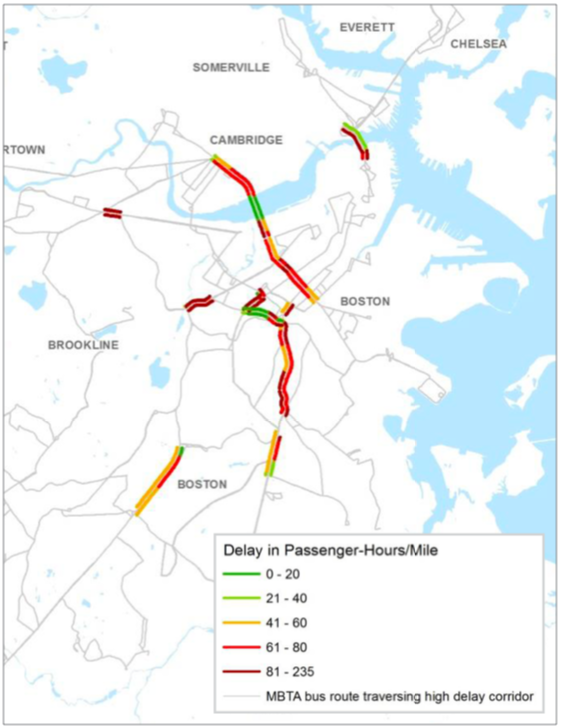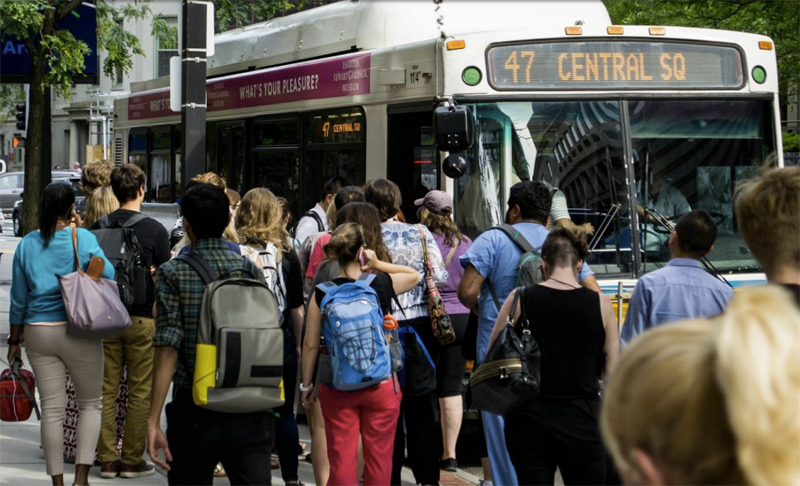In Boston, like many U.S. cities, fewer people are riding the bus. MBTA bus ridership fell 8 percent in 2016 compared to the previous year, even as the Boston region adds people and jobs.
The reason people are abandoning the bus is clear enough: Service is slow and unreliable. The region's most important bus routes tend to be the worst performers -- mired in congestion and delayed by a boarding process that takes forever. The slowest bus route in the system, the 1, also has the fifth-highest ridership.
The burden of bad bus service falls disproportionately on people of color and low-income people, who comprise a greater share of bus riders in the region compared to other modes of transit.
Making bus service work well again for all these riders isn't a huge, complicated undertaking. A new report from the local advocacy group LivableStreets Alliance highlights a few changes that could have a major impact on bus service in less than four years [PDF].
One key is dedicated bus lanes. By prioritizing transit on a relatively small number of streets, huge numbers of bus riders would get faster trips.
The LivableStreets Alliance has identified seven miles of congested streets where buses carry 92,000 passengers on weekdays -- about a fifth of all MBTA bus ridership. Converting general traffic lanes into bus lanes on these seven miles of streets would have a huge impact.

The MBTA tested out bus lanes on Washington Street with a low-cost experiment last year, using orange cones to convert a parking lane into a temporary bus lane. Passengers reported huge time savings.
What bus riders need, says the Alliance, is political leadership to make the leap from short-term experiments to permanent upgrades.
In addition to bus lanes, the Alliance recommends implementing traffic signals that can hold green lights for buses and creating better passenger environments bus stops. Only about 8 percent of MBTA bus stops have shelters. All high-ridership stops (with 70 or more daily boardings) should have shelters and be ADA accessible by 2021, the organization says.
Because these changes all involve city infrastructure, and most MBTA bus ridership is within Boston proper, the Alliance wants to see Mayor Marty Walsh hire staff to oversee and implement bus upgrades. Cities including Seattle, Baltimore, New York, and San Francisco all employ people who work specifically on improving bus service.
To generate funding for this initiative, the Alliance recommends a 15-cent surcharge on ride-hailing trips. A recent study from the Metropolitan Area Planning Council showed app-based services like Uber have been clogging streets, feeding a vicious cycle of declining bus service quality and worsening congestion.
One other major change the Alliance recommends is the adoption of all-door boarding to speed trips. The MBTA tested all-door boarding on the Silver Line last year and found it reduced the "dwell time" for buses by 30 percent. The agency says it aims to have all-door boarding in place systemwide by 2020.
"We're not doomed to poor transit service. At a local level, there are plenty of tools in our toolbox to fix this crisis," said LivableStreets Director Stacy Thompson. "Now's the time to step up and put them to work."






